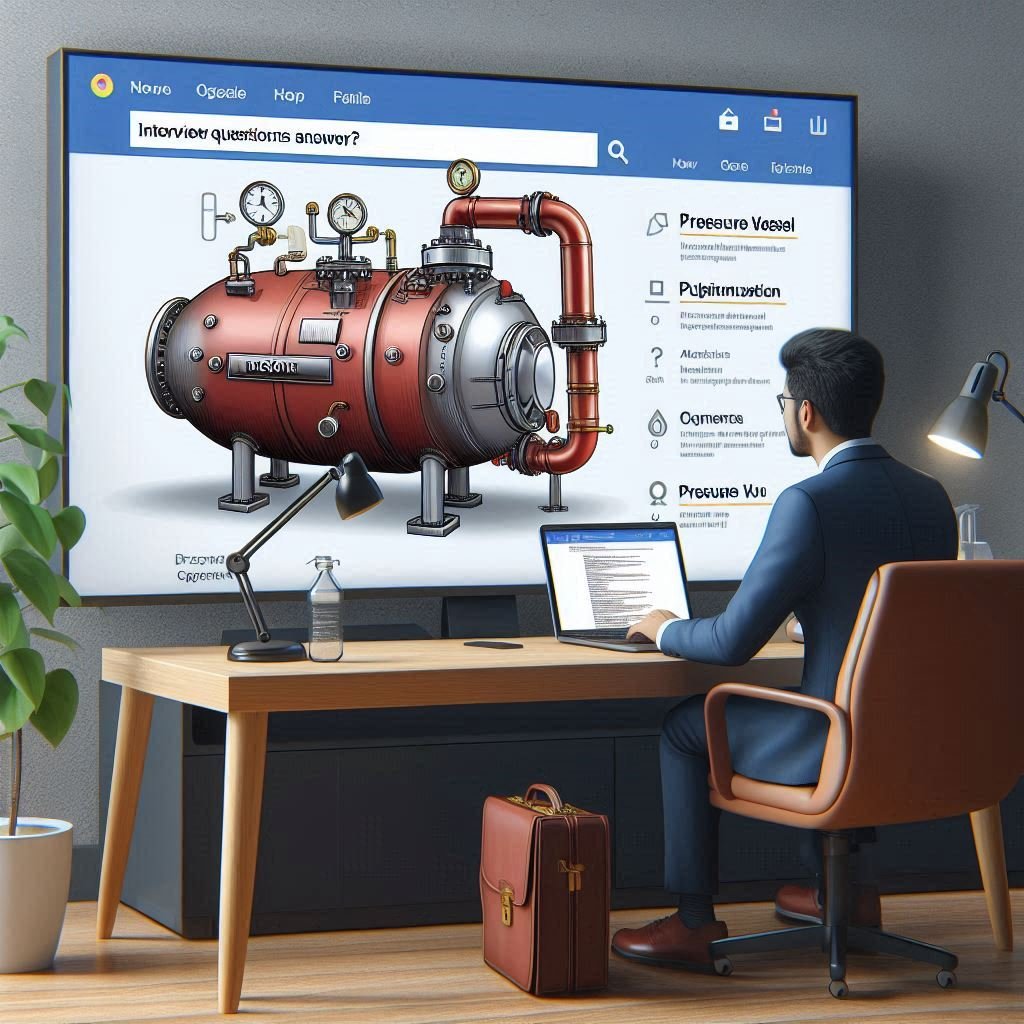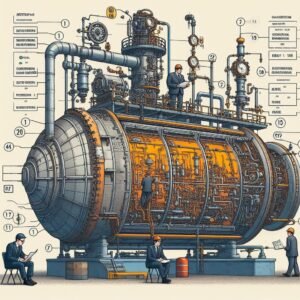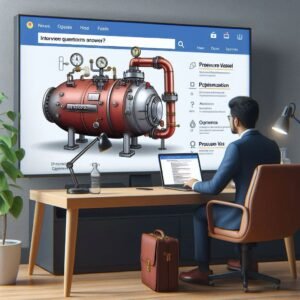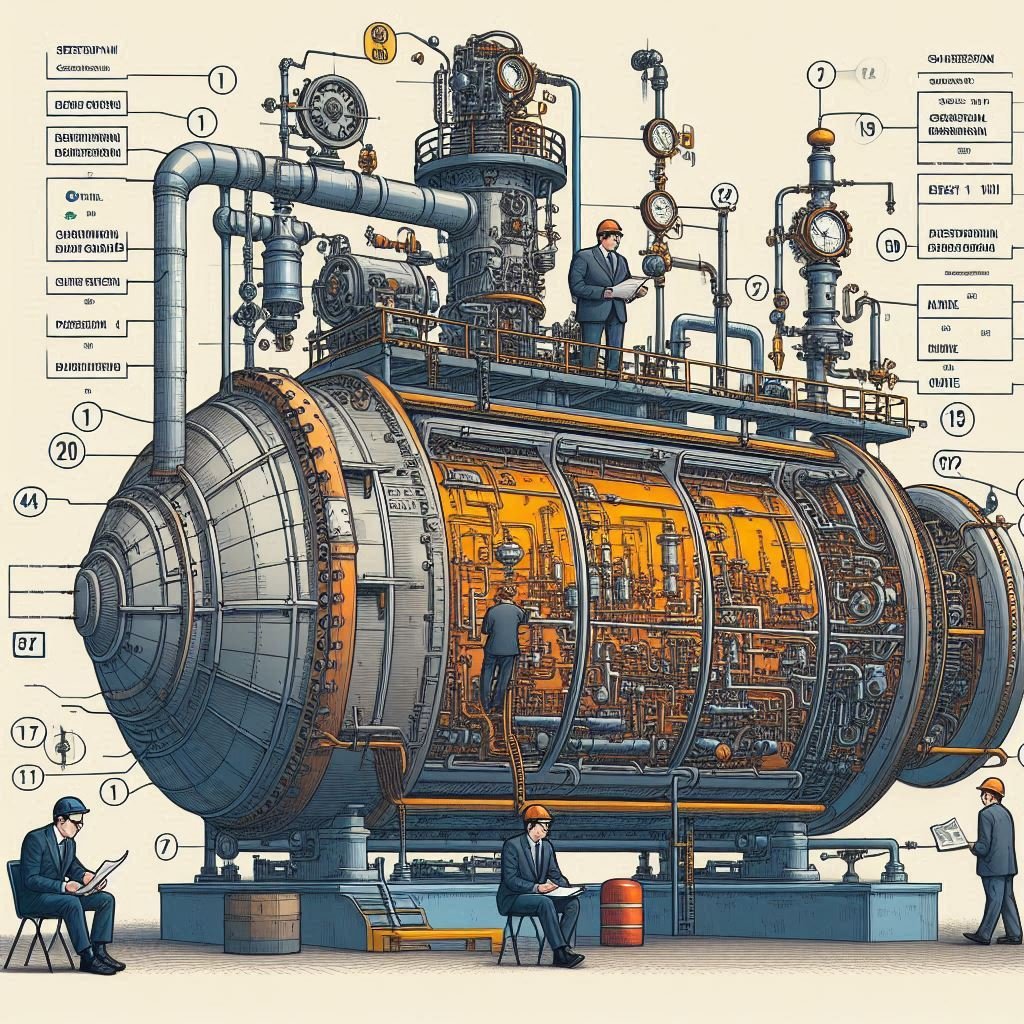Introduction:
Approaching technical interview questions, especially those related to ASME Section VIII, requires preparation, confidence, and the ability to communicate complex concepts clearly. By following these strategies and practicing your responses, you’ll be well-equipped to impress potential employers with your technical prowess and problem-solving abilities. Remember, each question is an opportunity to demonstrate your expertise and passion for mechanical engineering.
Navigating challenging ASME Section VIII interview questions requires preparation, confidence, and a solid understanding of pressure vessel design, fabrication, and regulatory compliance. By familiarizing yourself with these examples and practicing your responses, you’ll be better equipped to showcase your expertise and problem-solving skills during your next technical interview. Remember, each question is an opportunity to demonstrate your passion for engineering and commitment to excellence in pressure vessel design and safety.
Demonstrating strong problem-solving skills is also essential for excelling in technical interviews questions on Pressure Vessels focused on ASME Section VIII. By preparing thoughtful responses and showcasing your ability to think critically and creatively, you’ll impress interviewers and stand out as a capable engineer ready to tackle challenges in pressure vessel design and compliance. Remember, each question is an opportunity to highlight your expertise and passion for solving complex engineering problems effectively.

Strategies for approaching technical interview questions.
Q1: How should I prepare for technical interview questions related to ASME Section VIII?
A1: Start by thoroughly reviewing the ASME Section VIII standards and familiarizing yourself with common pressure vessel design principles.
Q2: What are some common technical interview questions I might encounter?
A2: You might be asked to explain the design criteria for pressure vessels or calculate design parameters based on ASME Section VIII.
Q3: How can I demonstrate my problem-solving skills during the interview?
A3: Walk through your thought process aloud when solving sample problems or discussing hypothetical design scenarios.
Q4: Should I focus more on theoretical knowledge or practical experience?
A4: Balance both. While theoretical knowledge is crucial, relating it to real-world examples from your experience adds depth to your answers.
Q5: How can I show my familiarity with ASME Section VIII codes and standards?
A5: Reference specific sections and clauses when discussing design considerations or compliance requirements.
Q6: What if I’m asked a question I don’t know the answer to?
A6: Remain calm and admit if you’re unsure. Offer to discuss how you would approach finding the solution, demonstrating your resourcefulness.
Q7: Is it important to stay updated with the latest developments in ASME Section VIII?
A7: Absolutely! Mention any recent updates or advancements in pressure vessel technology during your interview to showcase your awareness.
Q8: How can I effectively communicate technical concepts during the interview?
A8: Use clear, concise language. Avoid jargon unless necessary and ensure your explanations are easy for non-specialists to follow.
Q9: Should I ask questions during the interview to clarify technical points?
A9: Yes, asking thoughtful questions demonstrates your interest and understanding. It also helps to clarify any uncertainties you may have.
Q10: How can I demonstrate my passion for mechanical engineering during the interview?
A10: Share examples of projects or experiences that sparked your interest in pressure vessels or related technologies.
Q11: What role does critical thinking play in answering technical interview questions?
A11: Critical thinking is essential. Employ it to analyze problems from different angles and propose innovative solutions.
Q12: How important is it to provide detailed explanations for my answers?
A12: Very important. Detail shows your depth of understanding and ability to articulate complex ideas clearly.
Q13: Should I practice answering technical questions before the interview?
A13: Absolutely! Practice with peers or mentors to refine your answers and build confidence in discussing technical topics.
Q14: How can I stand out from other candidates during a technical interview?
A14: Showcase your enthusiasm, problem-solving skills, and ability to apply theoretical knowledge to practical scenarios.
Q15: What if I’m asked about a specific case study related to ASME Section VIII?
A15: Discuss the case study in detail, highlighting your analysis, recommendations, and any lessons learned from the scenario.
Examples of challenging ASME Section VIII technical interview questions:
Q1: What are some typical ASME Section VIII interview questions that engineers might find challenging?
A1: Engineers often face questions like, “How do you determine the required thickness of a pressure vessel according to ASME Section VIII?”
Q2: How can I approach answering a question about pressure vessel design criteria?
A2: Start by explaining the factors such as pressure, temperature, material selection, and corrosion allowances as per ASME Section VIII.
Q3: What if I’m asked to explain the difference between stress and pressure in the context of ASME Section VIII?
A3: Stress refers to internal forces within a material, while pressure is the force exerted per unit area on a surface due to fluid or gas.
Q4: How should I respond if I’m asked about the importance of ASME Section VIII in engineering practice?
A4: Highlight its role in ensuring the safety and reliability of pressure vessels through standardized design, fabrication, inspection, and testing procedures.
Q5: Can you give an example of a question that tests knowledge of ASME Section VIII material requirements?
A5: “What are the minimum design metal temperatures (MDMT) and impact test requirements for pressure vessel materials under ASME Section VIII?”
Q6: How should I prepare for a question regarding the interpretation of ASME Section VIII code clauses?
A6: Familiarize yourself with specific clauses related to design, materials, fabrication, inspection, and testing, and be ready to discuss their implications.
Q7: What if I’m asked about the challenges of implementing ASME Section VIII in a real-world engineering project?
A7: Discuss practical challenges such as balancing design requirements with fabrication constraints, compliance with regulatory changes, and ensuring operational safety.
Q8: How can I demonstrate my problem-solving skills when answering technical questions about ASME Section VIII?
A8: Walk through your approach to solving hypothetical design problems, considering factors like stress analysis, fatigue life, and failure modes.
Q9: Can you provide an example of a question about non-destructive examination (NDE) techniques under ASME Section VIII?
A9: “What are the advantages and limitations of radiographic testing (RT) versus ultrasonic testing (UT) for inspecting pressure vessels, according to ASME Section VIII?”
Q10: What if I’m asked to discuss recent updates or revisions in ASME Section VIII standards?
A10: Mention any significant updates such as changes in design formulas, new materials approvals, or revisions in inspection and testing requirements.
Q11: How should I handle a question about the implications of ASME Section VIII on international standards and regulations?
A11: Discuss the harmonization efforts between ASME standards and international codes, emphasizing compliance strategies and global market considerations.
Q12: Can you give an example of a scenario-based question related to ASME Section VIII compliance?
A12: “You discover a deviation from ASME Section VIII requirements during an inspection. How would you address this issue to ensure compliance and safety?”
Q13: What if I’m asked about the significance of quality control and assurance in ASME Section VIII compliance?
A13: Highlight the role of QA/QC processes in ensuring consistency, reliability, and traceability throughout the pressure vessel manufacturing and inspection phases.
Q14: How can I effectively communicate technical details when answering ASME Section VIII interview questions?
A14: Use clear and concise language, avoid jargon unless necessary, and provide practical examples or diagrams to illustrate your points.
Q15: What should I do if I encounter a question during the interview that I don’t know the answer to?
A15: Remain calm and honest. Offer to discuss your approach to finding the solution or ask for clarification on specific aspects of the question.
Tips for demonstrating problem-solving skills on ASME Section VIII – Pressure Vessels
Q1: Why are problem-solving skills important in technical interviews related to ASME Section VIII?
A1: Problem-solving skills show your ability to apply theoretical knowledge to real-world challenges, crucial in engineering roles.
Q2: How can I showcase my problem-solving skills during an ASME Section VIII interview?
A2: Discuss past projects where you resolved design or operational issues related to pressure vessels.
Q3: What if I’m asked a hypothetical problem-solving question about pressure vessel design?
A3: Break down the problem, consider factors like stress analysis and material selection, and propose a feasible solution.
Q4: Can you give an example of a question that tests critical thinking in ASME Section VIII interviews?
A4: “Given a sudden increase in operating pressure, how would you assess the safety of an existing pressure vessel design?”
Q5: How should I structure my answer to demonstrate logical thinking in problem-solving questions?
A5: Outline your approach step-by-step, from identifying the problem to evaluating alternative solutions and their implications.
Q6: Should I mention teamwork or collaboration when discussing problem-solving experiences?
A6: Absolutely! Highlight how you collaborated with colleagues to analyze issues and implement effective solutions.
Q7: Can you provide tips for communicating problem-solving processes effectively during an interview?
A7: Use clear language, avoid technical jargon unless necessary, and use examples or diagrams to illustrate your methods.
Q8: What if I encounter a problem-solving question that seems ambiguous or unclear?
A8: Ask for clarification on specific details or assumptions to ensure you understand the problem fully before proposing a solution.
Q9: How important is creativity in problem-solving for ASME Section VIII-related questions?
A9: Creativity can be crucial, especially when considering innovative approaches to design challenges or operational improvements.
Q10: What role does data analysis play in demonstrating problem-solving skills in ASME Section VIII interviews?
A10: Analyze data such as stress calculations, failure modes, or performance metrics to support your problem-solving approach.
Q11: Should I mention any tools or software I’ve used to aid in problem-solving related to pressure vessels?
A11: Yes, discuss tools like CAD software for design simulations or finite element analysis (FEA) for stress testing and optimization.
Q12: How can I show adaptability and flexibility in problem-solving scenarios?
A12: Discuss times when you adjusted your approach based on new information or unexpected challenges during a project.
Q13: Can you give an example of a behavioral question that assesses problem-solving skills in ASME Section VIII interviews?
A13: “Describe a time when you identified a design flaw in a pressure vessel. How did you address and resolve it?”
Q14: What if I’m asked to provide a solution to a problem that involves compliance with ASME Section VIII standards?
A14: Ensure your solution aligns with ASME Section VIII requirements, emphasizing safety, reliability, and regulatory compliance.
Q15: How should I conclude my answer to a problem-solving question during an interview?
A15: Summarize your approach and emphasize the positive outcomes or lessons learned from your problem-solving experience.
You can also find some good books on general interview questions for Mechanical Engineers here.
You can also visit blog on 50+ most important questions on Pressure Vessels by clicking here.








Excellent post. I used to be checking continuously this blog and
I am impressed! Very useful information specifically the last phase 🙂 I maintain such info a lot.
I used to be seeking this certain info for a long
time. Thank you and good luck.